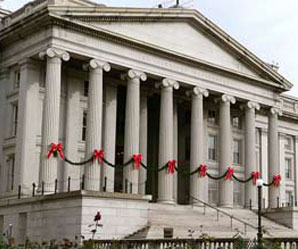After announcing second-quarter profits of $3.44 billion, Goldman Sachs is set to pay out well over $10 billion in compensation this year. The Wall Street Journal editorial board, of all people, makes the key point that all those profits, and all that money for Goldman employees, comes on the back of an insurance policy provided by you, the taxpayer:
What the Goldmans of the world have in addition to profits is the widespread belief that they are too big to fail…. Goldman will surely deny that its risk-taking is subsidized by the taxpayer—but then so did Fannie Mae and Freddie Mac, right up to the bitter end. An implicit government guarantee is only free until it’s not, and when the bill comes due it tends to be huge. So for the moment, Goldman Sachs—or should we say Goldie Mac?—enjoys the best of both worlds: outsize profits for its traders and shareholders and a taxpayer backstop should anything go wrong.
The Journal proposes a new tax (probably one of the first times it’s ever done so) on “too-big-to-fail” institutions to pay for potential bailouts. It’s a nice idea, but a more free-market solution (and one the Journal doesn’t mention) would be even better. Instead of taxing companies to provide for future bailouts, the government could decide not to bail out any more companies. But what about the companies that are “too big to fail?” The government could and should break them up. If a company is too big to fail, it’s too big to exist. That might make Goldman unhappy, so it probably won’t happen. The New York Times’ Joe Nocera has written about that dilemma before:
If Mr. Obama hopes to create a regulatory environment that stands for another six decades, he is going to have to do what Roosevelt did once upon a time. He is going to have make some bankers mad.
Does the Obama administration have the political will to break up financial giants? If the government’s continuing transfer of wealth from ordinary taxpayers to Goldman partners is any indication, probably not.









